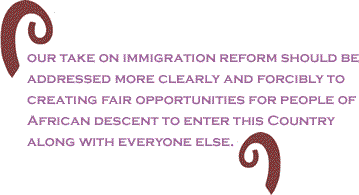
|
||||||||||||||||||||||
|
|
||
 |
||
|
For my money the debate over immigration reform is far too narrow.´┐Ż Our civil rights leaders have followed the predictable dynamic created by Hispanics who have justly mobilized to normalize their status in America.´┐Ż´┐Ż We should support them because the stakes of strengthening our coalition at this moment in history will bear substantial fruit as both groups become a larger part of American society, its political system and its economy.´┐Ż So, it is a civil rights struggle to oppose the racist law passed by the Arizona legislature to profile Hispanics and relate any illegal acts to their immigration status. Nevertheless, it is also a civil rights struggle to use this moment to finally eliminate the racism in immigration law in general.´┐Ż This means that our take on immigration reform should be addressed more clearly and forcibly to creating fair opportunities for people of African descent to enter this Country along with everyone else. Over the years some progress has been made.´┐Ż For example, the initial quota established in 1924 which allowed 1,100 Africans to enter a year, increased to 1,400 by 1952.´┐Ż´┐Ż After African countries became independent in the 1960s, immigration to the US increased, reaching´┐Ż 40,000 per year by 2000.´┐Ż´┐Ż Between l960 and 2008 African immigration to the US amounted to 1.4 million,´┐Ż Still, this constituted only 3.8% of the total foreign population of 38 million in that period. The result of such a restrictive entry policy for Africans has been that largely those with economic resources have been eligible to apply for immigrant status.´┐Ż Thus, while 23% of Americans in general have college degrees, 51% of African immigrants have college degrees.´┐Ż This has also meant that while the myth of the African cabdriver persist, the real story is that the average wage of Africans is among the highest in the nation second only to Asians.´┐Ż The second generation of African born immigrants in the US are now prominent in American universities and in many areas of corporate and human service occupations.´┐Ż The situation of Haitian immigrants, long a source of vexation to many, was exposed again by the recent hurricane as blatantly racist.´┐Ż´┐Ż Some Haitians who survived the hurricane and made it to the US found themselves locked up in detention centers in Miami for the lack of visas.´┐Ż This is consistent treatment of Haitians who have been routinely and vigorously turned away from US shores while white Cubans have enjoyed a Cold War policy that has privileged their immigration to the US.´┐Ż Between 1980 and 2008 total Haitian immigration to the United States was 535,000 but Cuban immigration during that same period was nearly one million.´┐Ż The arrangement for Cuban immigrants was always´┐Ż´┐Ż based on a political fiction because Cuba has been´┐Ż no real threat to the United States, so the comparative treatment of Haitians and other Afro-Caribbean immigrants must be justified on the basis of a racial prohibition.´┐Ż The test is that if Cubans immigrants had been black instead of white would they have been allowed to come?
Apparently, the US was paying no attention to Mexican/Latin American immigration as Latin American immigration in that period constituted 53% (32% Mexican ) of all sources, with over ten million undocumented people from that region in the country.´┐Ż Meanwhile it paid attention to Haiti, since only 76,000 immigrants were ´┐Żunauthorized´┐Ż from Haiti in that same period. One
of the routes to the stabilization of Haiti in the post-hurricane
era would be to allow humanitarian immigration.´┐Ż´┐Ż How would it look
to have satisfied the One source of the future expansion of the ´┐ŻAfrican American´┐Ż population is by natural birth rates, but another is by immigration, to miss this opportunity to elimination racist immigration is to limit the future power of our community. BlackCommentator.com Editorial Board member, Dr. Ron Walters, PhD is a Political Analyst, Author and Professor Emeritus of the University of Maryland, College Park. His latest book is: The Price of Racial Reconciliation (The Politics of Race and Ethnicity) (University of Michigan Press). Click here to contact Dr. Walters. |
||
If you would like to comment on this article, please do so below. There is a 400 character limit. You do not need a FaceBook account. Your comment will be posted here on BC instantly. Thanks. Entering your email address is not mandatory. You may also choose to enter only your first name and your location.
|
||
Thank you very much for your readership. |
||
| Any BlackCommentator.com article may be re-printed so long as it is re-printed in its entirety and full credit given to the author and www.BlackCommentator.com. If the re-print is on the Internet we additionally request a link back to the original piece on our Website. | ||
| |
||
May 13, 2010 |
| Executive Editor: David A. Love, JD |
| Managing Editor: Nancy Littlefield |
| Publisher: Peter Gamble |
| Est. April 5, 2002 |
| Printer Friendly Version in resizeable plain text format |
 |
 |
 |

|
 |
| |
| |













































